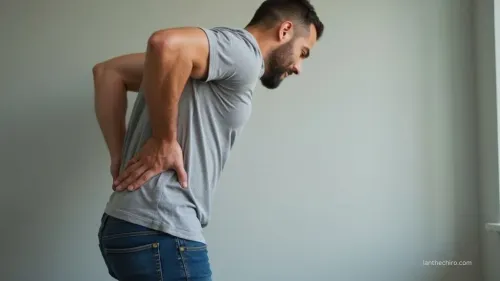Slip Disc Symptoms Malaysians Ignore (And When to See a Chiropractor)
You may brush off mild back pain, tingling in your limbs, or stiffness as normal fatigue, but these are early slip disc symptoms many Malaysians ignore.
Everyday habits like poor posture and long hours sitting can make things worse. If you notice ongoing nerve pain, weakness, or numbness, don’t just self-treat, see a chiropractor early to prevent lasting damage.
There are common myths and practical warning signs you should know to protect your spine and overall health.
Common Slip Disc Symptoms Malaysians Dismiss

Although it’s easy to brush off mild back or neck discomfort as a result of muscle strain or poor posture, many Malaysians unknowingly ignore the early symptoms of a slip disc. You might notice a tingling sensation, numbness, or weakness in your arms or legs, but dismiss these as temporary or insignificant.
Persistent pain when coughing, sneezing, or bending often gets overlooked, too, assumed to be just a part of daily life or aging. Recurrent stiffness or limited mobility may seem like simple fatigue, but these can actually signal underlying disc issues.
How Everyday Habits in Malaysia Contribute to Disc Issue
Many early slip disc symptoms go unnoticed, but your daily routines might be making things worse without you realising it. Sitting for long hours on poorly designed chairs, common in Malaysian offices, increases spinal pressure and speeds up disc wear.
Poor posture while glued to mobile devices, slouching as you text or game, puts extra strain on your neck and upper back. If you regularly lift heavy items without proper technique or carry bags on one shoulder, you’re adding uneven pressure to your spine, raising your risk of disc issues.
A sedentary lifestyle doesn’t help either; when you don’t move enough, spinal discs get less blood flow, lose essential nutrients, and become more vulnerable. Small habits, if unchecked, can set the stage for disc problems.
The Risks of Ignoring Persistent Back and Nerve Pain

If you’ve been brushing off persistent backaches or nerve pain, like tingling, numbness, or weakness, it's time to take these symptoms seriously.
Ignoring ongoing discomfort can lead to worsening nerve damage, sometimes becoming permanent if not addressed within weeks. Chronic symptoms such as numbness or weakness often point to an underlying disc problem that needs early intervention for the best chance at recovery.
Unchecked discomfort can cause lasting nerve damage, early intervention for symptoms like numbness or weakness is crucial for recovery.
Self-treating with rest or painkillers might seem convenient, but it can mask the true issue and allow structural damage to progress. Delaying professional evaluation increases your risk of complications, including loss of bladder or bowel control.
Don’t underestimate mild or intermittent pain; persistent nerve pain signals your body’s need for proper care before the damage becomes much harder to reverse.
When Self-Treatment Isn’t Enough: Red Flags to Watch For
When your back or nerve pain lingers or worsens despite your best self-care efforts, it's a sign you shouldn't ignore. Persistent pain, numbness, or weakness that doesn’t improve can point to nerve compression.
Be alert for red flags like pain radiating down your arms or legs, sudden muscle weakness, or changes in sensation. If you experience loss of bladder or bowel control, seek immediate medical attention, this is a critical red flag.
Difficulty walking, new numbness, or paralysis also signal that you need urgent care. When rest, ice, or other home remedies fail to bring relief within days, it’s time to consult a chiropractor.
Acting early can prevent long-term complications and support your recovery. Don’t hesitate when these warning signs appear.
Myths About Slip Discs That Lead to Delayed Treatment

Although slip disc symptoms can be subtle, common myths often make people underestimate their seriousness. You might think a slipped disc always causes severe pain, but mild tingling or numbness can be just as significant.
Some misconceptions suggest only injuries cause slipped discs, but age-related changes are often to blame. It’s also false that only older adults get slipped discs, young people can experience them too.
Many believe surgery is the only solution, which discourages seeking early, non-invasive treatments like chiropractic care. Finally, dismissing persistent discomfort as “normal” leads to delayed diagnosis and treatment.
Recognising these misconceptions helps you act promptly if symptoms arise, preventing lasting damage. Don’t wait for severe pain, early professional evaluation is key to effective recovery and long-term spinal health.
Frequently Asked Questions About Slip Disc Symptoms & Treatment
Should I Go to a Chiropractor for a Slipped Disk?
Yes, chiropractors can help manage symptoms of a slipped disc through targeted spinal adjustments and movement-based therapy. This can reduce pain, improve mobility, and support long-term spinal function.
What Happens if You Ignore a Slipped Disc?
Ignoring a slipped disc can lead to chronic pain, numbness, muscle weakness, or nerve damage. In severe cases, it may affect bladder or bowel control. Early treatment can prevent these complications.
When Should You See a Doctor About a Slipped Disc?
See a doctor if your symptoms last longer than two weeks, worsen over time, or include numbness, weakness, or changes in bowel or bladder control. These may indicate nerve involvement that needs urgent attention.
Should I See a Chiropractor or Osteopath for Slipped Disc?
Both chiropractors, such as Ian The Chiro, and osteopaths offer non-surgical options for slipped disc care. Chiropractors typically focus more on spinal mechanics, while osteopaths may include broader manual therapy. Choose based on your needs and their specific experience with disc issues.
Conclusion: Listen to Your Spine Before It Shouts
Don’t let uncertainty keep you guessing, those mild aches or tingling sensations could be your body’s cry for help. What if ignoring them means risking your long-term health?
By recognising the warning signs of a slip disc early and knowing when to seek a chiropractor’s care, you’re taking control of your well-being.
The next move is yours, will you listen to your body’s signals, or wait and wonder what might happen next? The choice is vital.














